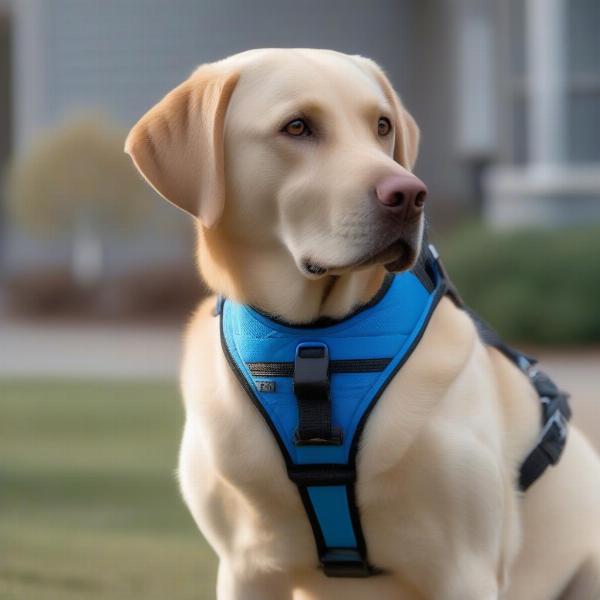A blind dog relies heavily on its other senses, particularly touch and smell, to navigate the world. A well-fitted harness plays a crucial role in providing comfort, safety, and guidance for these special dogs. Choosing the right dog harness for a blind dog isn’t just about finding something that looks good; it’s about selecting a harness that enhances their mobility and confidence. This article will guide you through the essential factors to consider when selecting a harness for your visually impaired companion.
Understanding the Needs of a Blind Dog
Blind dogs experience the world differently. They depend on their owner for guidance and reassurance. A harness becomes an essential tool for communication and safe navigation. It provides a secure point of contact for gentle guidance and helps prevent disorientation and anxiety. The harness also allows the owner to feel their dog’s movements and anticipate potential obstacles.
Key Features of a Good Harness for a Blind Dog
Several key features distinguish a suitable harness for a blind dog:
- Comfort: The harness should be padded and made of breathable material to prevent chafing and discomfort, especially during longer walks.
- Secure Fit: A snug fit is essential to prevent the harness from slipping or twisting, which can disorient a blind dog. Adjustable straps allow for a customized fit.
- Front and Back Clips: A harness with both front and back clips offers greater control and versatility in guiding your dog.
- Handle: A sturdy handle on the back of the harness allows you to assist your blind dog over obstacles or in challenging situations.
- Reflective Material: For added safety during walks in low-light conditions, choose a harness with reflective strips or patches.
Different Types of Harnesses for Blind Dogs
Several types of harnesses work well for blind dogs:
Vest Harnesses
Vest harnesses distribute pressure evenly across the chest and back, providing excellent comfort and support. They often have multiple adjustment points for a perfect fit.
 A dog wearing a vest harness
A dog wearing a vest harness
No-Pull Harnesses
No-pull harnesses gently discourage pulling by applying pressure to the chest or shoulders. They are particularly helpful for blind dogs who may be more prone to pulling due to anxiety or disorientation.
Mobility Harnesses
Some harnesses are specifically designed for dogs with mobility issues, offering extra support and stability. While not exclusively for blind dogs, these can be beneficial for older blind dogs or those with other physical limitations.
Fitting the Harness Correctly
A properly fitted harness is crucial. It should be snug but not restrictive. You should be able to fit two fingers between the harness and your dog’s body.
Training Your Blind Dog to Use a Harness
Introduce the harness gradually and positively. Associate it with positive experiences like walks and treats. Use consistent verbal cues when guiding your dog with the harness.
What to Avoid When Choosing a Harness
- Avoid harnesses that restrict movement or breathing.
- Harnesses with narrow straps can dig into the skin and cause discomfort.
- Avoid harnesses made of materials that are not durable or weather-resistant.
Frequently Asked Questions
- Do all blind dogs need a harness? While not strictly mandatory, a harness greatly improves safety and control when walking a blind dog.
- Can a blind dog still enjoy walks? Absolutely! With the right harness and guidance, blind dogs can enjoy enriching and stimulating walks.
- How do I introduce my blind dog to a new harness? Start slowly and positively, associating the harness with treats and praise.
- What other accessories are helpful for blind dogs? A “halo” or bumper can help a blind dog navigate obstacles.
- Where can I find a good quality harness for my blind dog? Pet supply stores and online retailers offer a wide selection of harnesses.
Related Articles on ILM Dog
About ILM Dog
ILM Dog is a leading online resource for dog owners worldwide, providing expert advice on all aspects of dog care, including breed selection, health, training, nutrition, grooming, and product recommendations. We’re dedicated to helping you provide the best possible care for your canine companion, whether they are a special needs dog or a perfectly healthy pup. Contact us today for personalized advice: [email protected] or +44 20-3965-8624.